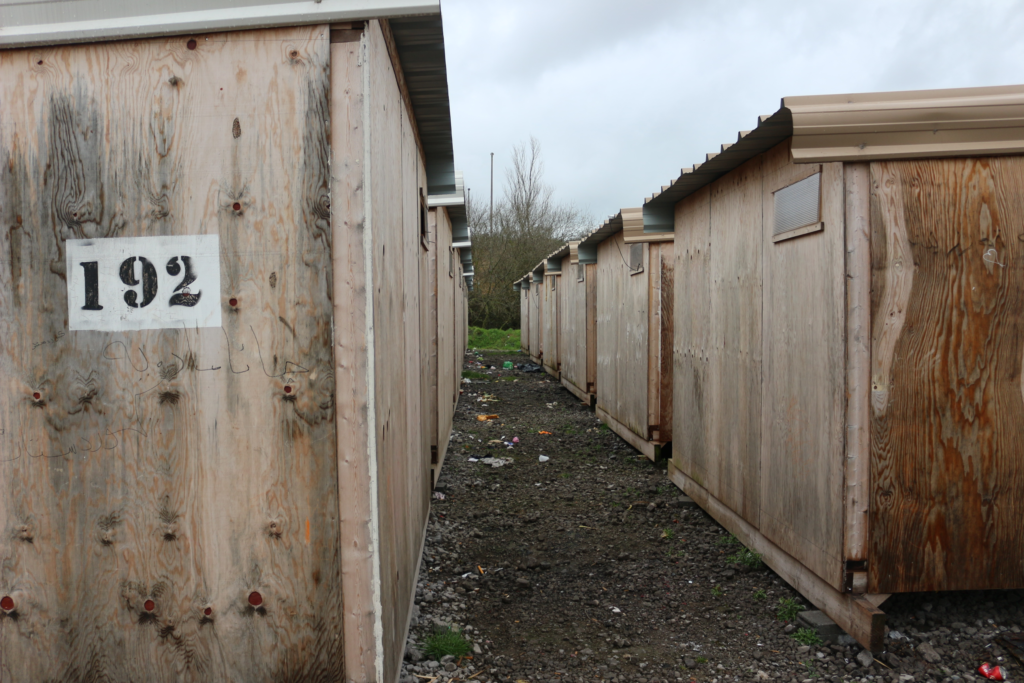Outside the windswept port of Dunkirk, in northern France, sits a migrants’ camp called La Linière. Home to around 1,400 people, it lies 25 miles from Calais and the now-demolished camp that became known as the “Jungle”. La Linière opened a year ago, with the collaboration of Médicins sans Frontières and a mayor who was proud to create a space for migrants to “stop, to rest and to think about their route … in complete safety”. Instead of makeshift tents pitched in deep mud, the year-old camp in Grand-Synthe consists of numbered chipboard cabins, plus shower blocks, a laundry, a communal kitchen, a women’s centre and a children’s play area.
Unlike in the Jungle, there is no church here, and no mosque, for the residents who hail from Iraqi Kurdistan, Afghanistan, Iran, Syria, even Vietnam. A local government representative says she is not authorised to speak to the press, but one of the volunteers is quick to explain why the authorities don’t allow worship facilities to be built.
“The Afghans built a mosque, but it was burnt down,” says Laila Mohamed, a member of a local Evangelical church, who converted from Islam 20 years ago. Fear of violence is also the reason, it is believed, why African migrants do not live in the camp, and instead subsist in squalor in makeshift settlements among the windswept fields and woodland of the Pas de Calais region.
A nearby church, Dk Live, led by Mrs Lydie Granger, began distributing food in the camp 18 months ago and today they provide clothing, trainers and bedding to whoever needs it. They also offer lifts to church to those who want to come – mainly Iranians. They say they have encountered Syrian Catholics and an Iranian Jew.
Mrs Granger has recently heard that an Iranian Christian couple who suddenly stopped attending the church had not made it to England but had suffered a tragedy. The wife had abandoned her journey after being raped by a trafficker, and the charity that helps run the camp, AFJ, rang and asked Mrs Granger to step in, saying it could not guarantee the couple’s safety in the camp. The husband had received threats from people in the camp after he asked the police to start an inquiry into the rape. The church put them up in a hotel, and today the couple are being looked after by a French family in a nearby town.
Was this a case of targeting a Christian? “It’s a mixture,” replies Mrs Granger. “She’s a lady; [the smugglers] knew they were Christians; there’s also a matter of ethnicity, because they were Iranians.” She continues: “The problems they had in their own country – they come with them!”
A report last month in the Observer found that sexual abuse of women and children was “common” in the camp. Migrants and volunteers say the camp is controlled by Kurdish mafia, and that smugglers move freely among the migrants living there. Police stand guard at the gates 24/7, but within its wire fences, control is far more primitive. “After dark, the camp becomes a ghetto,” says Mrs Mohamed.
Sara, who fled Iran after becoming a Christian, told World Watch Monitor that the day before, she had heard gunfire just outside her cabin – at 5pm.
The local paper, La voix du nord, reported that five people received medical help after the incident: two migrants with bullet wounds; one migrant and a security guard with knife wounds; and another migrant who collapsed. Armed special police briefly boosted security at the gates.
Some Christians experience intimidation. Mrs Mohamed says that Christians in the camp tell her people bang on the thin walls of their cabins after dark, screaming abuse at them. The reason is money – “so that smugglers can let a cabin out to a family for their own profit, knowing that a lot of Iranians and Iraqis who come are quite wealthy,” she says.
Certainly, Sara is fearful. She is well-known in the camp for working alongside the volunteers and helping migrants obtain sleeping bags and other essentials.
We meet her on the steps of her cabin, and she lowers her voice when she says she is a Christian. What does she fear?
“Maybe violence, maybe [I’ll be] killed,” she says. She doesn’t want her neighbours to know about her faith – if they did, she would want to move cabin. One who did know spat at her, she says.

Another Iranian convert, Ramin, who ran a house church in his home city of Shiraz, is more sanguine.
“The people in the camp know I’m Christian. Sometimes people have thrown small stones at my cabin, but for me it’s no problem, I’m at peace,” he says.
He converted from Zoroastrianism five years ago. “Before, I would have responded with aggression, but not now,” he adds.
The Christians who arrive in the camp from the Middle East bring – if not the experience of persecution – the expectation of it, as political leaders increasingly use Islam to denote good citizenship, effectively “othering” non-Muslim citizens. As in the Middle East, migrant Christians’ unlikeliness to take up arms, and their probable wealth, make them soft targets. Greed and guns rule here, and there is a clear hierarchy in which non-Muslims are another category of vulnerability, along with women and children. To adapt Orwell, all the camp’s residents are vulnerable, but some are more vulnerable than others.
